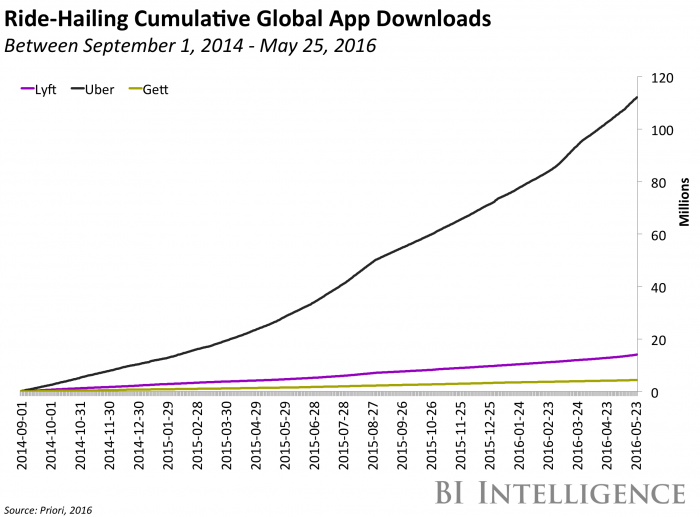Here's what President Trump means for the sharing economy

BII
This story was delivered to BI Intelligence "E-Commerce Briefing" subscribers. To learn more and subscribe, please click here.
President Donald Trump’s cabinet appointments and policies regarding jobs, trade, and regulation could have a far-reaching impact on sharing economy companies like Uber, Airbnb, and Lyft, CNET reports.
The new president has said little about the sharing economy so far, but his policy positions indicate his administration will be a mixed bag for these firms.
Trump’s cabinet nominees and certain policy positions look like they will benefit sharing economy companies:
Trump’s nominee for transportation secretary, Elaine Chao, is a well-known critic of government regulation, and will oversee the creation of new rules for self-driving cars. If the transportation department takes a hands-off approach to self-driving car regulation, it will help Uber’s and Lyft’s ongoing efforts to deploy driverless taxis.
Labor secretary nominee Andrew Puzder has taken public stances against employment and workplace regulations, as well as minimum wage hikes. This bodes well for Uber and other sharing economy companies that designate their workers as independent contractors rather than employees, which means workers have to pay for their own healthcare and social security taxes.
Trump’s generally anti-regulation campaign rhetoric is a positive sign for sharing economy companies that have faced various regulatory hurdles, such as Airbnb. The online travel platform has come up against local regulations on home rentals in San Francisco and New York.
However, Trump’s stance against globalization and threats to start a trade war with China could cripple companies’ attempts to expand overseas. Uber pulled out of China last year, but Airbnb has been attempting to expand its business in the country by partnering with local tech providers and working closely with local governments in Chinese cities like Shanghai and Shenzen.
Last year, Airbnb created a separate Airbnb China unit and announced plans to grow the unit’s staff from 30 to 300. If Trump started a trade war with China, the Chinese government could respond by imposing punitive taxes and regulations on companies with US ties. Such moves would hamper the ambitions of companies like Airbnb to gain traction in the Chinese market.
It's also unclear how the new administration will affect driverless taxis. Since the start of 2016, automakers, tech companies, and ride-hailing services have been racing to create a driverless taxi service. This service would mirror how an Uber works today, but there wouldn’t be a driver.
So far, the race has been brutal, as companies jockey for position by spending billions to acquire/invest in companies that will help make a driverless taxi service a reality. Uber recently took the pole position by announcing it would begin piloting its self-driving taxi service (with a driver still behind the wheel) in Pittsburgh later this month. But other companies, including almost every automaker, are quickly catching up as we reach the mid-way point in the driverless taxi race.
For the past two years, BI Intelligence, Business Insider’s premium research service, has been tracking the progress of the self-driving car space. As our reports have shown, the evolution is happening much faster than many expected, but there are still many barriers that have to be overcome before driverless cars become a reality.
BI Intelligence has compiled a detailed report on driverless taxis that analyzes the rapidly evolving driverless taxi model and examines the moves companies have made so far in creating a service. In particular, it distills the service into three main players: the automakers who produce the cars, the components suppliers who outfit them to become driverless, and the shared mobility services that provide the platform for consumers to order them.
Here are some of the key takeaways from the report:
Fully autonomous taxis are already here, but to reach the point where companies can remove the driver will take a few years. Both Delphi and nuTonomy have been piloting fully autonomous taxi services in Singapore.
Driverless taxi services would significantly benefit the companies creating them, but could have a massive ripple effect on the overall economy. They could cause lower traffic levels, less pollution, and safer roads. They could also put millions of people who rely on the taxi, as well as the automotive market, out of a job.
We expect the first mass deployment of driverless taxis to happen by 2020. Some government officials have even more aggressive plans to deploy driverless taxis before that, but we believe they will be stymied by technology barriers, including mass infrastructure changes.
But it will take 20-plus years for a driverless taxi service to make a significant dent in the way people travel. We believe the services will be launched in select pockets of the world, but will not reach a global level in the same time-frame that most technology proliferates.
In full the report:
Analyzes the moves 18-plus companies have made in creating a driverless taxi service.
Discusses the corporate and societal benefits of a driverless taxi service
Examines the regulators conundrum when deciding if they should or should not allow driverless taxis to operate
Determines the potential cost of a driverless taxi vs. owning a car, riding in a ride-hailing service, or riding in a taxi
Explains the barriers including the technological and regulatory barriers these companies will face
To get your copy of this invaluable guide, choose one of these options:
Subscribe to an All-Access pass to BI Intelligence and gain immediate access to this report and over 100 other expertly researched reports. As an added bonus, you'll also gain access to all future reports and daily newsletters to ensure you stay ahead of the curve and benefit personally and professionally. >> START A MEMBERSHIP
Purchase & download the full report from our research store. >> BUY THE REPORT
The choice is yours. But however you decide to acquire this report, you’ve given yourself a powerful advantage in your understanding of the future of driverless taxis.
See Also:

 Yahoo News
Yahoo News 
